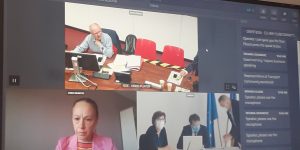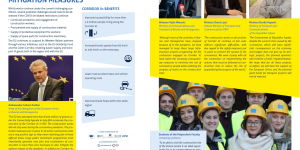Representatives of the European Commission and of Bosnia and Herzegovina (BiH) met on 14-15 November 2017 in Brussels for the 2nd Sub-committee meeting on Economic and Financial issues and Statistics held under the Stabilisation and Association Agreement. The meeting was co-chaired for BiH by Mrs Vera Letica, Assistant Minister at the BiH Ministry of Finance and by Mr Uwe Stamm from the Directorate General Economic and Financial Affairs and Mr Martin Schieder from the Directorate General for Neighbourhood and Enlargement Negotiations of the European Commission. During a constructive discussion, the European Commission and BiH discussed the economic and fiscal situation of the country and in the EU as well as progress with structural reforms in BiH.
In the meeting it was noted that the economy in BiH has started to show signs of recovery. Exports from BiH have significantly increased by close to 18 percent in the third quarter 2017 compared to 2016. Industrial production is showing strong growth as is consumer spending. Interest rates for commercial and private lending while high in comparative terms are at their lowest level since the establishment of the Central Bank of BiH and consumer lending is up. The collection of indirect taxes has significantly increased (10% in the third quarter of 2017). Debt to GDP ratio is at a relatively low level.
Nevertheless, BiH still faces important challenges such as below potential growth, high unemployment, a low efficiency of public administration and a growth model with too much emphasis on private consumption, which is to a large extent financed by workers remittances. Public investment is too low to support a faster improvement in the living standard of the countries’ citizens. Regrettably, the absence of a new excise tax law on fuel, which is a requirement for many important infrastructure projects under the EU Connectivity Agenda, is holding back public investments and reduces GDP growth.
BiH should step up structural reforms. Strong, coordinated and continued political support for the swift implementation of much needed structural reforms is critical. The EU Economic and Financial Dialogue should help to accelerate the country’s catching-up process and the compliance with the criteria for EU accession. BiH should step up its efforts to ensure effective and full implementation of the Reform Agenda.
While output growth is stable with some improvements in the labour market, BiH develops below its potential. Key reasons for this are low investment, reflecting a poor business environment and insufficient public funds devoted to improve the country’s infrastructure and capital endowment. Fragmented markets, a poorly functioning labour market, a weak rule of law and the insufficient alignment of education with labour market needs are further impediments to a fast catching-up process.
BiH should strengthen the financial sector by addressing non-performing loans, strengthening banking sector supervision and the bank resolution framework. There is a need to improve the quality of fiscal governance. BiH should enhance the growth-friendliness of investment and improve the targeting of social spending.
As regards Public Internal Financial Control, BiH is encouraged to further define and implement a system of managerial accountability and to strengthen internal audit capacity. For External Audit, the Commission advocates the need to ensure the functional and financial independence of the four State Audit institutions, in line with international standards.
Finally, the Commission stressed the need to upgrading the BiH statistical system towards full compliance with EU standards and to aggregate and consolidate lower level statistics to country-wide data sets.



